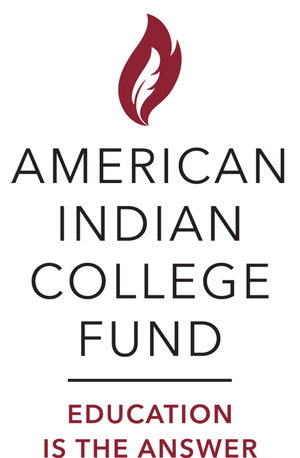Scholarship Covers Tuition and All Expenses
DENVER, May 9, 2024 /PRNewswire/ -- Jade Araujo, an enrolled member of the Wampanoag Tribe of Gay Head (Aquinnah) in Massachusetts and a descendant of the Tlingit and Koyukon Athabascan tribes in Alaska, is the third person to have been awarded the American Indian College Fund Law School Scholarship. Araujo is a senior at Stanford University who will graduate in June with a degree in political science and will enter Harvard Law School in the fall. She is the daughter of Todd Araujo (Aquinnah Wampanoag) and Jaeleen Kookesh (Tlingit and Koyukon Athabascan).
The American Indian College Fund Law School Scholarship was funded by a $1 million gift from an anonymous donor. It covers tuition and all costs of attendance for an American Indian or Alaska Native law student enrolled in Harvard Law School's three-year course of study. The scholarship goal is to eliminate financial hurdles to earning a Juris Doctor degree at Harvard Law School and to increase the number of Natives with a law degree to ensure the rights of Indigenous people and their nations are upheld. Araujo is the third scholar to receive this prestigious scholarship from the College Fund.
She credits Eleanor Hebert (Aquinnah Wampanoag), her paternal grandmother, for igniting her interest to attend Harvard Law School. Araujo says she is interested in the rigor and level of academic resources at Harvard, as well as its history with and proximity to the Aquinnah Wampanoag tribal lands on Martha's Vineyard. The first Native American graduate of Harvard University, Caleb Cheeshahteaumuck, was Aquinnah Wampanoag. Araujo notes she also has Cape Verdean ancestry and is drawn to Boston's large Cape Verdean community.
Araujo comes from a family with a background steeped in the law. Both of Araujo's parents attended law school and her father was the first-ever Aquinnah Wampanoag attorney. Her late maternal grandfather, Albert Kookesh, was one of first Alaska Natives to attend law school and was a fierce advocate for Alaska Native rights. Araujo was raised in Juneau, Alaska on Tlingit land. It was there, she said, surrounded by Alaska Native leaders like her mother and grandfather, where she was inspired by the innovative ways tribes can use the law to protect their cultures and secure their futures.
As an intern for U.S. Senator Elizabeth Warren (Massachusetts), Araujo learned the skills needed to be an effective government leader. She conducted background research for the Honoring Promises to Native Nations Act—legislation that would reaffirm the nation-to-nation relationship between the federal government and Tribal Nations and strengthen federal programs that support Native communities, such as Native education, health care, and housing. She also interned at the White House in the Office of Legislative Affairs, where she met members of Congress and wrote memoranda for White House staff on Congressional hearings and events.
Araujo's experience in Washington, D.C. gave her valuable insight into the need for a background in, and knowledge about, important policy issues and how they will impact citizens. She also began to understand the importance of communicating with constituents about how laws will be implemented, as it often takes time for the impact of the law to be seen.
Araujo's main interest is constitutional law. "I have seen the ways Supreme Court decisions have impacted Tribal communities, such as Oklahoma v. Castro-Huerta, which limited tribal sovereignty." Whether it is the Indian Child Welfare Act, water rights, or jurisdiction over cases involving missing and murdered Indigenous women, she believes Native people schooled in the law are needed to represent their communities, as much of what happens in Indian Country hangs on the decisions of the nine Supreme Court justices.
In addition to Indian Country needing more Native lawyers, Araujo said more Native law clerks are needed at the federal level because many judges and justices have little experience with Federal Indian law. She explained that this gives rise to "confusing and contradictory decisions that undermine tribal sovereignty at almost every turn." She added, "I would also love to see a Native Supreme Court justice!"
It is not just lawyers, judges, justices, and legislators that are important in safeguarding Native communities' rights. Every citizen plays a role through their vote, making it important that Native people register and cast their ballots. "People's voices inform elected officials as to where to go with their policy."
In her spare time, Araujo enjoys spending time with her family. In addition to her parents, she has a twin sister (Maya) attending the University of California, Los Angeles and a younger brother (Antone) who will graduate from high school next month. Jade says they provide her with the most humor and support in her life. She also loves movies and dancing. She participated in a traditional Tlingit dance group throughout her childhood. She is currently a member of the Stanford American Indian Organization, Alaska Native Student Association, and Stanford Women Politics, which connects her to women on campus interested in law and policy. She also spent a quarter abroad in Madrid, Spain through Stanford's overseas studies program. There, she was a practicum student at Fundación Mujeres—a foundation for women's rights—on their violence prevention team.
"I am so honored and humbled to have been chosen to receive this scholarship," Araujo said.
About the American Indian College Fund— The American Indian College Fund has been the nation's largest charity supporting Native higher education for 34 years. The College Fund believes "Education is the answer" and provided $17.4 million in scholarships and other direct student support to American Indian students in 2022-23. Since its founding in 1989 the College Fund has provided more than $319 million in scholarships, programs, community, and tribal college support. The College Fund also supports a variety of academic and support programs at the nation's 35 accredited tribal colleges and universities, which are located on or near Indian reservations, ensuring students have the tools to graduate and succeed in their careers. The College Fund consistently receives top ratings from independent charity evaluators and is one of the nation's top 100 charities named to the Better Business Bureau's Wise Giving Alliance. For more information about the American Indian College Fund, please visit www.collegefund.org.
Journalists—The American Indian College Fund does not use the acronym AICF. On second reference, please use the College Fund.
SOURCE American Indian College Fund

WANT YOUR COMPANY'S NEWS FEATURED ON PRNEWSWIRE.COM?
Newsrooms &
Influencers
Digital Media
Outlets
Journalists
Opted In






Share this article